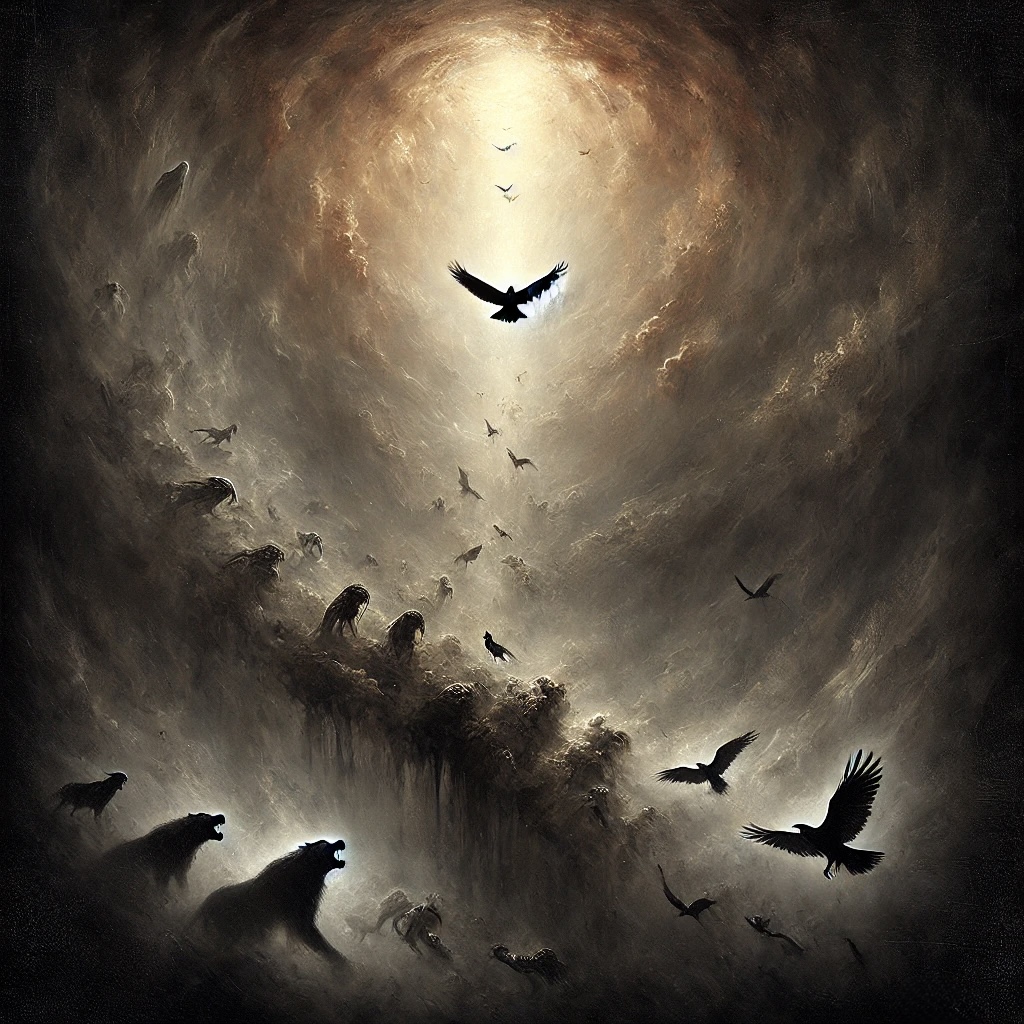“Flee! In haste you must go
Clear your mind, your soul
Catch! Life’s beauty and glow
Pray, for serenity’s warm blow”
Vested, your hardships, your flaws
Bested, ambitions and your goals
Tested, flesh, brain, and soul
Wasted, breath, heat, and all
Void, it was and Void it is
Void, before and to the edge
Void, is warmth, and cold again
Void, is more than nothingness
Within Void, beasts that roam,
Vermin, swine, down and low
Bored, and filthy they endure
Till Void consumes the flesh,
And their debt is paid in soul
Within Void, the wise fools groan
Tears, and lies they spawn, and
Cast in red like blood, the Void
And dowse it in forgetful cologne
The Void, moulded as they please
It’s black, cold, endless, and bleak
Or vivid, warm, with a caressing release
To Hell or Heaven–is what they plead
Within Void, wings could grow
The wise fools now–a Murder of Crows
Yet in the Void, soaring above all
A Hawk liberated, doomed like all
To Heaven or to Hell?
Nowhere else to go
Soaring and flapping,
Awaiting death’s blow
Anticipating the caress,
Of Void’s only goal
Wretched, and frightened,
Bored, yet tirelessly afloat
“I have only created Jinns and men, that they may serve Me.”
— Surah 51 (The Winnowing Winds)
Possible Interpretation
This is a philosophical meditation on how humans construct meaning and purpose whilst facing mortality’s uncertainty. The poem isn’t advocating suicide but exploring the human condition: we’re all caught between loving life and fearing death, seeking purpose whilst suspecting futility.
The opening captures conflicting advice society offers: flee from suffering, embrace beauty, pray for peace. The second stanza presents life as a testing ground where we “vest” ourselves in struggles, are “bested” by ambitions, “tested” in all aspects, yet ultimately everything is “wasted”—a nihilistic view that effort is meaningless.
The Void is death, the afterlife, or perhaps existence’s fundamental meaninglessness. Crucially, it’s neutral—humans colour it according to their psychological needs. For the “vermin, swine” living purposeless lives, Void represents relief: “Till Void consumes the flesh, / And their debt is paid in soul”—they view life as debt, death as release from obligation. They welcome oblivion.
For “wise fools” (intellectuals, religious believers, philosophers), Void is frightening, so they “mould” it—inventing Heaven and Hell, making death fit their moral frameworks. They “dowse it in forgetful cologne,” perfuming the unknown with comforting narratives. The “tears, and lies they spawn” suggests these certainties are self-deception, casting the Void “in red like blood”—making it vivid and meaningful when it’s actually unknowable.
The hawk represents someone who achieves perspective—“soaring above all”—perhaps through contemplation or awareness. Yet this “liberation” is hollow: they’re still “doomed like all,” still facing the same ultimate fate regardless of awareness.
The final image is existential: we’re all “tirelessly afloat,” expending energy to keep living, simultaneously “bored” (life lacks inherent meaning) yet “wretched, and frightened” (death terrifies us). We “anticipate the caress / Of Void’s only goal”—death comes for everyone, whether we see it as relief, punishment, or neither. Purpose, the poem suggests, may be a construct we create to endure this impossible position.

